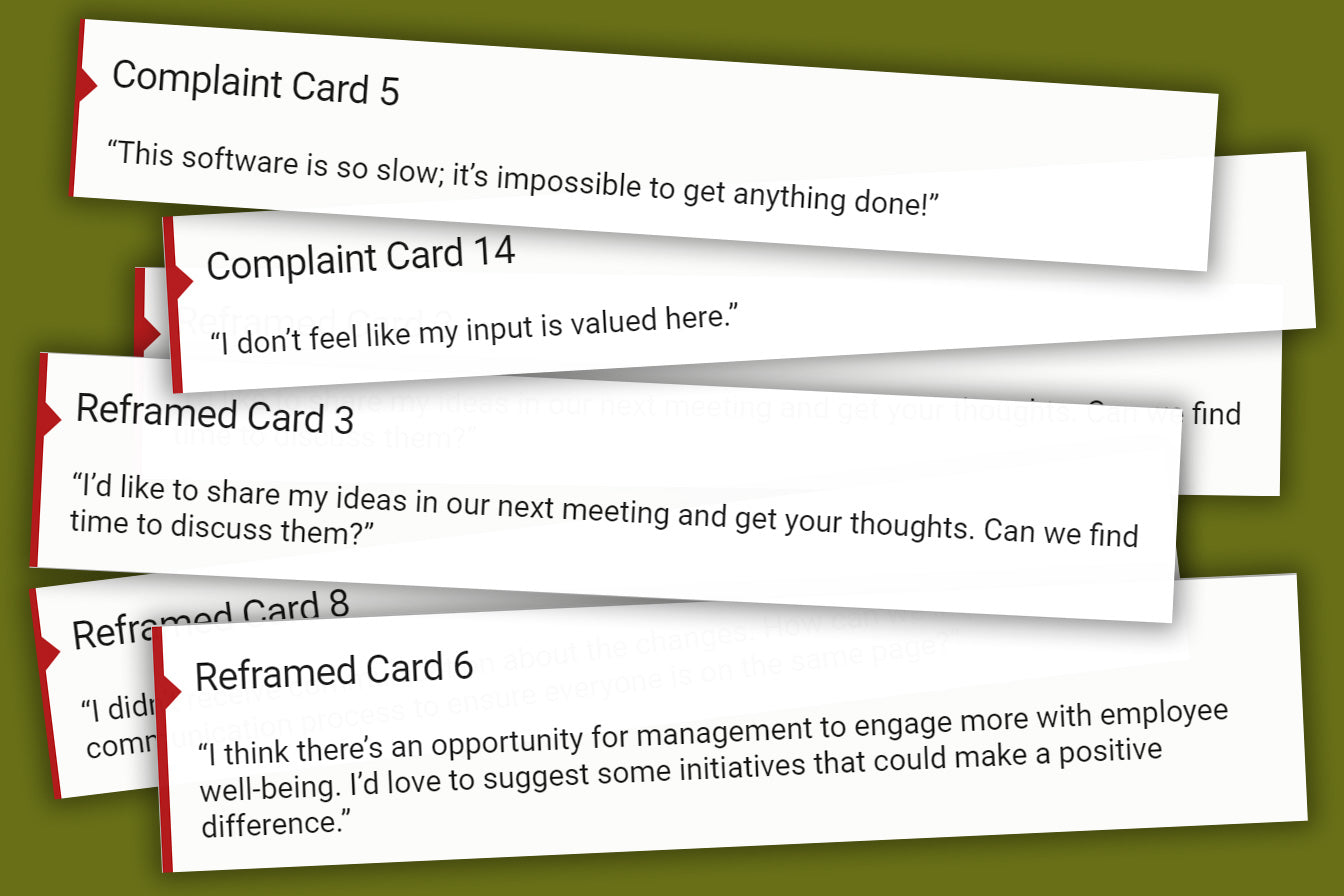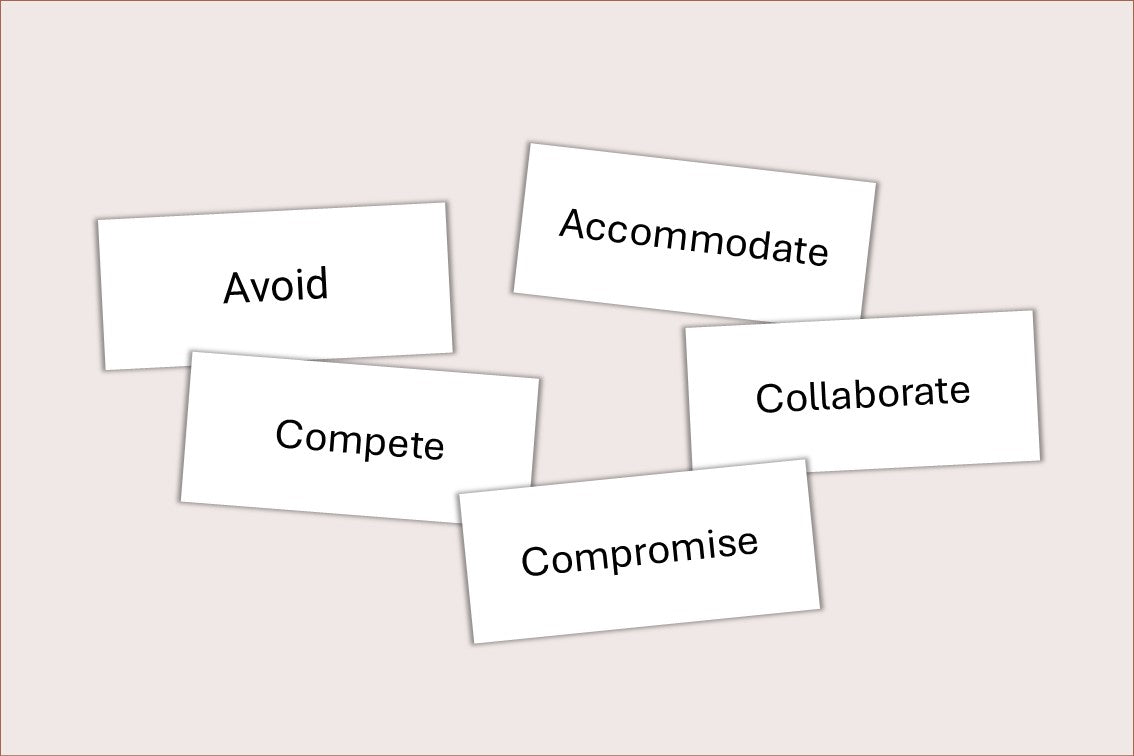Purpose
This exercise helps delegates develop their skills in handling complaints and reframing negative feedback into constructive statements. By focusing on turning complaints into opportunities for dialogue and problem-solving, delegates learn to communicate more effectively and maintain a positive atmosphere even in challenging situations.
Objective
Each delegate is given a complaint. Their task is to reframe the complaint into a more constructive statement. Delegates work in pairs to provide feedback on each other’s reframing, and the group will vote on the best reframing examples at the end.
What You Need
- Complaint Cards and corresponding Reframed Cards. They have an ID number to make it clear which cards correspond with each other. You need as many sets as you have delegates. A set of these is provided at the end so you can print them. Here is an example:
Complaint Card 2
“This report is full of mistakes, and now I have to redo it all!”
Reframed Card 2
“I noticed some errors in the report that need fixing. Let’s review it together to ensure accuracy next time.”
- Paper
Setup
- Explain that the goal is to improve complaint handling by learning how to turn negative statements into constructive, solution-focused ones. Emphasise that this skill is essential for maintaining positive relationships in both professional and personal settings.
- Pair up delegates. They will work together to practice reframing the complaints and providing feedback on each other’s approach. Use a group of 3 if you have an odd number of delegates.
- Distribute two Complaint Cards to each pair.
- Get ‘Delegate A’ in each pair to read one of the Complaint Cards aloud and then immediately reframe it into a more constructive statement. For example, a complaint like “You never communicate clearly with the team” could be reframed as “I’d like us to work on clearer communication to ensure everyone is on the same page.”
- Get ‘Delegate B’ in each pair to give feedback on how well ‘Delegate A’ reframed the complaint. The feedback should focus on how effectively the reframed statement shifted the tone from negative to constructive and whether it invited a solution-focused conversation.
- After feedback, get ‘Delegate A’ to write down their reframed answers, along with the ID of the card.
- Get them to swap roles so that ‘Delegate B’ reads the other Complaint Card and reframes it, and ‘Delegate B’ provides feedback. They should make a note of it as before.
- Allocate 2 minutes for this round.
- Now provide the corresponding Reframed Cards to each group based on the Complaint Cards they have got. Pay attention to the ID number written on each card so they are distributed correctly.
- Get groups to compare their reframed answers with the two Reframed Cards they have received and learn from them.
- Provide feedback as necessary.
- Allow 2 minutes for this part.
- Continue with the next round. First collect all the Reframed Cards from all groups. Get each group to pass on their pair of Complaint Cards to the next group. Get them to repeat the exercise with the new cards and give them the corresponding Reframed Cards when the have got their answers. Continue until all Complaint Cards have been processed by all groups. You will end up with as many rounds as half the number of delegates.
- After the final round, bring the entire group back together and follow with a discussion.
Timing
Explaining the Exercise: 2 minutes
Activity: (2 min reframing + 2 min feedback) x N delegates /2 rounds = 16 minutes for 8 delegates
Group Feedback: 10 minutes
Discussion
Facilitate a group discussion to reflect on the exercise. Use the following questions to guide the conversation:
- What strategies did you find most helpful for turning a negative complaint into a constructive statement?
- How did it feel to reframe a complaint immediately? Was there any aspect that was particularly challenging?
- What feedback from your partner was most useful in improving your reframing skills?
- Did any of the complaints seem harder to reframe than others? Why do you think that was?
- What did you learn about the impact of positive language in diffusing tense situations?
Variations
- Role-Play Scenarios. Instead of reading the complaints directly from a card, have delegates role-play a situation where the complaint might naturally occur, such as a customer giving feedback or a manager discussing a missed deadline. This adds a layer of realism and makes the reframing exercise more dynamic. Then they have to redo the roleplay with the reframed version.
- Group Brainstorming. After the individual pair work, take one challenging complaint and have the entire group brainstorm different ways to reframe it. This encourages collective problem-solving and allows delegates to see a variety of approaches.
- Custom Complaints. Assign an ID to each group. After the final round, get each pair to create two new complaints, preferably related to their own jobs and industry, and write them on two separate papers. They should write their group ID on them too. They should then pass these cards to another group. Now get them to do one more round with these new complaint cards. Pairs should reframe them as before and make a note of their answers. Bring back everyone together and get each team to share their complaints and reframed answers. Get the rest of the class to provide feedback.
Complaint Cards and Reframed Cards
Complaint Card 1
“The project is behind schedule, and it’s your fault!”
Reframed Card 1
“I see that we are behind schedule. Let’s collaborate and identify ways to catch up and prevent delays in the future.”
Complaint Card 2
“This report is full of mistakes, and now I have to redo it all!”
Reframed Card 2
“I noticed some errors in the report that need fixing. Let’s review it together to ensure accuracy next time.”
Complaint Card 3
“You never listen to my ideas during meetings!”
Reframed Card 3
“I’d like to share my ideas in our next meeting and get your thoughts. Can we find time to discuss them?”
Complaint Card 4
“Why do I always have to pick up the slack when others don’t do their jobs?”
Reframed Card 4
“I’ve been taking on extra work lately to help meet deadlines. Can we discuss a more balanced way to share the workload?”
Complaint Card 5
“This software is so slow; it’s impossible to get anything done!”
Reframed Card 5
“I’ve noticed the software is running slowly, which is affecting productivity. Could we explore solutions to improve its performance?”
Complaint Card 6
“Management doesn’t care about employee well-being.”
Reframed Card 6
“I think there’s an opportunity for management to engage more with employee well-being. I’d love to suggest some initiatives that could make a positive difference.”
Complaint Card 7
“This new process is way too complicated and wastes time.”
Reframed Card 7
“I find the new process challenging and time-consuming. Can we simplify it to make it more efficient?”
Complaint Card 8
“Nobody communicated the changes to me; I had no idea what was happening!”
Reframed Card 8
“I didn’t receive communication about the changes. How can we improve our communication process to ensure everyone is on the same page?”
Complaint Card 9
“You always interrupt me when I’m speaking!”
Reframed Card 9
“I’d appreciate being able to finish my thoughts before we discuss further. Can we try to give each other space to speak fully?”
Complaint Card 10
“This place is always disorganised, and it’s driving me crazy!”
Reframed Card 10
“I think we could benefit from a more organized system. I’m happy to suggest some ideas or help create a plan.”
Complaint Card 11
“You never communicate clearly with the team.”
Reframed Card 11
“I think we could benefit from clearer communication within the team. Let’s discuss ways to make sure everyone has the information they need.”
Complaint Card 12
“This product is too expensive and doesn’t meet our needs.”
Reframed Card 12
“While this product has potential, it seems a bit beyond our budget and doesn’t fully align with our needs. Could we explore other options or negotiate improvements to make it a better fit?”
Complaint Card 13
“Your department always misses deadlines.”
Reframed Card 13
“I’ve noticed some challenges with meeting deadlines. How can we work together to identify any obstacles and improve our timelines?”
Complaint Card 14
“I don’t feel like my input is valued here.”
Reframed Card 14
“I’d love to feel more involved in the decision-making process and believe my input can contribute positively. Could we find ways to make our discussions more inclusive?”
Soft Skills Training Materials
Get downloadable training materials
Online Train the Trainer Course:
Core Skills
Learn How to Become the Best Trainer in Your Field
All Tags
Training Resources for You

Course Design Strategy
Available as paperback and ebook

Free Training Resources
Download a free comprehensive training package including training guidelines, soft skills training activities, assessment forms and useful training resources that you can use to enhance your courses.

Our Comprehensive Guide to Body Language

Train the Trainer Resources
Get Insights - Read Guides and Books - Attend Courses
Training Materials
Get downloadable training materials on: Management Training, Personal Development, Interpersonal Development, Human Resources, and Sales & Marketing














Leave a comment
All comments are moderated before being published.
This site is protected by hCaptcha and the hCaptcha Privacy Policy and Terms of Service apply.